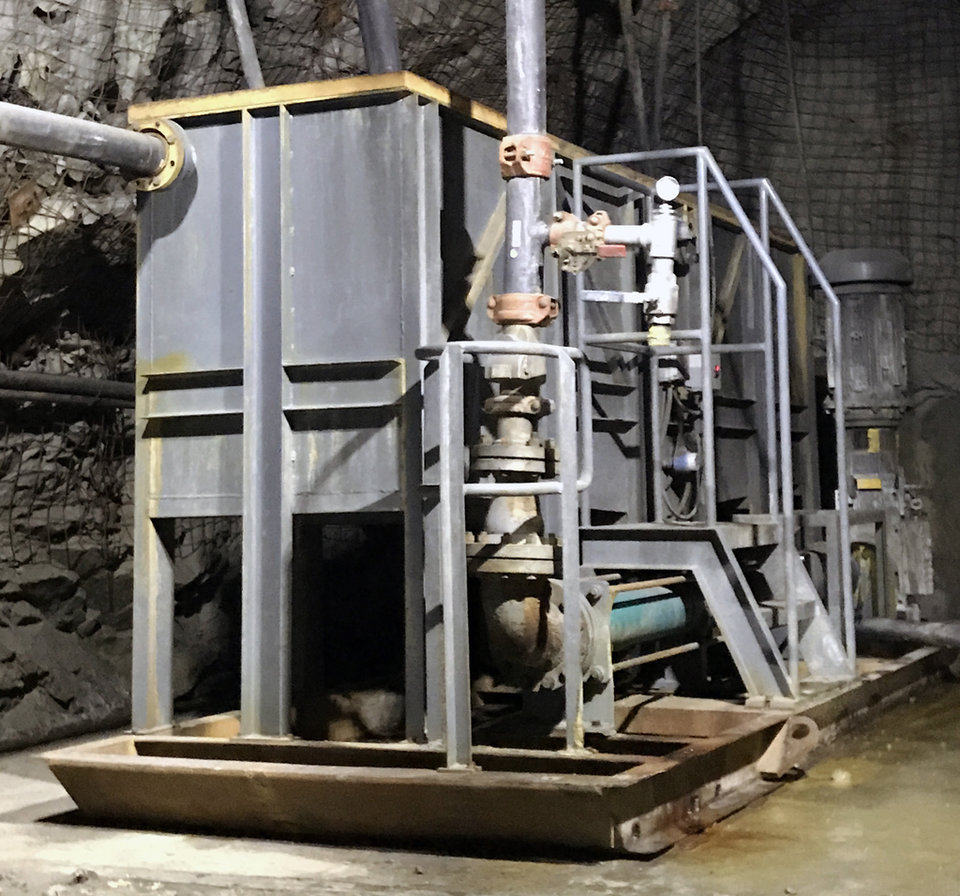In order to reliably guarantee dewatering in a gold mine in the US state of Montana and to be able to ensure safe extraction of mineral resources, the operator procured a mobile backup unit in addition to the main system with centrifugal pumps. Because the mine water is characterised by a low pH value and highly corrosive and abrasive properties,
the managers decided on a particularly robust solution with a
customer-specific design from NETZSCH Pumpen & Systeme GmbH in Waldkraiburg: its essential component is a progressing cavity pump, whose special displacement principle makes it particularly well suited to conveying wastewaterwith abrasive solids.
Ukraine’s growing wage arrears
Continuous, effective dewatering is needed for many underground and opencast mines to enable continued operation. The water, which seeps into the shafts and galleries, could otherwise lead to flooding. Pumping the water out is therefore an essential process which is generally carried out by several conveying systems.
The operator of a gold mine in Montana approached NETZSCH, because they wanted to procure a backup dewatering unit in addition to the main system with
centrifugal pumps.
NETZSCH proposed the NEMO® SY progressing cavity pump, because due to its special displacement principle it is particularly well suited for conveyance of wastewater with abrasive solids.
Immediately after delivery, it was used exclusively as a backup unit for the centrifugal pumps. However, shortly afterwards these aggregates failed, meaning that the NETZSCH solution became the primary dewatering equipment. In the process, it turned out to be more reliable than the previous system.
NETZSCH proposed the NEMO® SY progressing cavity pump

Roger Willis,
Manager Business Field Chemical, Pulp & Paper
During the first ten months of 2017, Ukraine spent $2.15bn on coal imports
Separatist complications
For more than 60 years, NETZSCH Pumpen & Systeme has served markets worldwide with NEMO® progressing cavity pumps, TORNADO® rotary lobe pumps, NOTOS® multi screw pumps, grinding machines, barrel emptying systems, dosing systems and accessories, providing customised, sophisticated solutions for applications
in every type of industry. With a workforce of over 2,000 and a turnover of more than 245 million euros (2016 financial year), NETZSCH Pumps & Systems is the largest business unit with the highest turnover in the NETZSCH Group, alongside NETZSCH Analysing & Testing and NETZSCH Grinding & Dispersing.
The NETZSCH system became the primary dewatering equipment down in the shaft, because in the process, it turned out to be more reliable than the previous centrifugal pumps.

A time for communication
Ukrainian state mines currently employ 51,000 workers, and are the main source of employment in regions such as the Donetsk coal basin. Mine closures over the last few years have already decimated towns and the government does not desire to close more but there is little clarity on how to progress in a profitable and sustainable way.
“The development of state-owned mines is possible in a stable environment, but wages must be paid on time,” said Trade Union of Coal Industry Workers of Ukraine deputy chair Valery Mamchenko. “Last year, UAH2.8bn ($100m) was allocated for the development of the coal industry, including the wage fund, but this year the amount is less than half.”
Without communication with unions and workers, many fear that Ukraine’s coal mining industry will remain stuck in its cycle of non-payment, protests and emergency measures. “It is essential to pay wage arrears in full; stamp out corruption in the industry; appoint managers of enterprises and mines on merit alone; and establish an effective social dialogue with trade unions,” said the Independent Trade Union of Miners of Ukraine president Mychailo Volynets.
The next few years will determine the future of Ukraine’s mining industry; now is the time for the government to focus on and support coal communities. Whether or not mining is to continue to play an important part in Ukraine’s economy and the lives of its citizens, or if it is time for the subsidies to be reduced and new energy industries to be grown, a plan must be made.
Ukrainian state mines currently employ 51,000 workers, and are the main source of employment in regions such as the Donetsk coal basin. Mine closures over the last few years have already decimated towns and the government does not desire to close more but there is little clarity on how to progress in a profitable and sustainable way.
“The development of state-owned mines is possible in a stable environment, but wages must be paid on time,” said Trade Union of Coal Industry Workers of Ukraine deputy chair Valery Mamchenko. “Last year, UAH2.8bn ($100m) was allocated for the development of the coal industry, including the wage fund, but this year the amount is less than half.”
Without communication with unions and workers, many fear that Ukraine’s coal mining industry will remain stuck in its cycle of non-payment, protests and emergency measures. “It is essential to pay wage arrears in full; stamp out corruption in the industry; appoint managers of enterprises and mines on merit alone; and establish an effective social dialogue with trade unions,” said the Independent Trade Union of Miners of Ukraine president Mychailo Volynets.
The next few years will determine the future of Ukraine’s mining industry; now is the time for the government to focus on and support coal communities. Whether or not mining is to continue to play an important part in Ukraine’s economy and the lives of its citizens, or if it is time for the subsidies to be reduced and new energy industries to be grown, a plan must be made.
It is essential to pay wage arrears in full [and] stamp out corruption in the industry
Contact information
PO Box 946
Travelers Rest
SC 29690
United States of America
Web: www.netzsch.com
Email: nfo.nps@netzsch.com